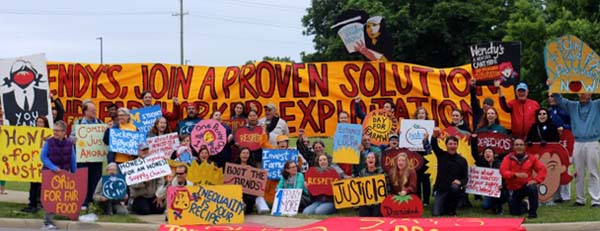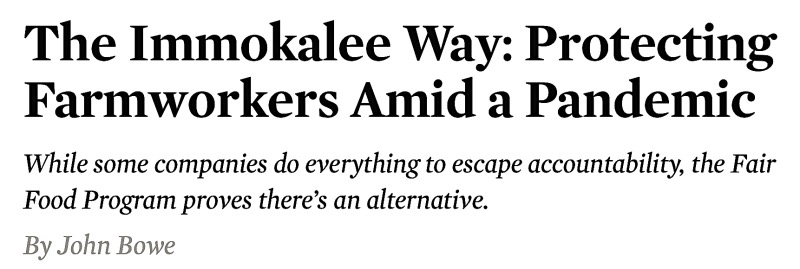Excellent reporting from The Nation takes sweeping look at this spring’s first big COVID-19 outbreak among essential farmworkers — involving workers sleeping two to a bed in overcrowded, unpermitted housing — at Green Empire greenhouse in upstate NY;
Green Empire greenhouse “owned by Ontario-based Mastronardi Produce, the largest distributor of hydroponic, indoor-grown produce in North America, and owner of at least six such facilities across the United States”;
While Wendy’s says Green Empire is not in its supply chain, Mastronardi is known supplier to Wendy’s;
The Nation: “The outbreak at Green Empire, critics say, was the inevitable outcome of a legal structure that allows companies like Green Empire, Mastronardi, and the fast-food and grocery chains they supply to escape accountability for the safety of the farmworkers who pick their fruits and vegetables”;
FFSC Executive Director, Judge Laura Safer Espinoza: “Buyers who refuse to help impose accountability throughout the system enable the continued existence of unconscionable actors who perpetuate the labor abuse so common in agriculture. It creates a market for them to continue operating. But now, during the pandemic, it’s worse: They put our food supply in jeopardy, along with their workers and the community in which they live”;
The Nation: “Wendy’s Chief Communications Officer Liliana Esposito told me that while Wendy’s is aware of the history of abuse in agriculture, the company prefers to hire corporate social responsibility monitors rather than engaging directly with workers, as stipulated by the FFP. “We require all our ag suppliers to go through a process where they assure us, where they demonstrate to us that they’ve been audited by a credible human rights organization, including labor rights”…
John Bowe, journalist and author of the seminal 2008 book “Nobodies: Modern American Slave Labor and the Dark Side of the New Global Economy” featuring the CIW’s early anti-slavery efforts, put his considerable talents to work last month investigating the widely-reported COVID-19 outbreak this past spring among migrant farmworkers harvesting tomatoes and other vegetables at the greenhouse giant Green Empire in Oneida, NY. Bowe talked to Green Empire workers, the farm labor contractor involved, local farmworker advocates, local health officials, local motel staff, Green Empire representatives, Wendy’s spokespeople, and FFP representatives, among others.
What resulted is a thoroughgoing recounting and analysis of a shameful failure of social responsibility on multiple levels, an abdication of duty by key players to protect hundreds of essential workers who put themselves in grave personal danger to harvest vegetables for major buyers — and for the rest of us — during the national lockdown. It is a MUST read for anyone interested in understanding the food industry’s abject failure to treat its essential workers as essential people. You can find the story in its entirety here.
It begins with the words of a worker whose poverty left her no choice but to accept a job in a known hotspot, even after arriving and learning the she would be sharing a double bed with another worker, a stranger:
When I first heard about the virus, it was April. I was in Pittsburgh, staying with friends,” “Rosy,” a 45-year-old Haitian farmworker, said through a face mask. She’d come to the United States, eager for work, she explained. But when a job materialized offering decent wages for picking tomatoes in upstate New York, she hesitated. “We knew New York was the worst,” she said, regarding the spread of Covid-19. “But,” she shrugged, “I needed money. I needed to work.”
Rosy (who, like most farmworkers I interviewed, asked to remain anonymous to avoid retaliation) arrived in Oneida, a leafy Erie Canal town about four hours northwest of New York City. She was immediately taken aback by the lax workplace precautions. In spite of the virus’s well-publicized infectiousness, she said workers on and off the job were neither wearing masks nor paying special attention to social distancing. Rides on the company bus to and from the job site were crowded, as was seating at the worker cafeteria.
Worst of all, she said, were the housing arrangements. Upon arrival, she said, she’d been deposited at a Days Inn motel in nearby Canastota. “Those in charge initially placed me in a room with three people. I was the fourth. We would have to sleep two per bed. I was told I’d have to wait for more space to free up,” she said. Imprudent as it seemed, she thought, “Well, since everyone else is accepting this, I will, too.”
It goes on to describe the role of the farm labor contractor, MAC, in creating the dangerous condition and serving as a legal lightning rod for liability, protecting the larger players further up the supply chain:
Labor contractors, also known as recruiters, are common in low-wage industries like forestry, meat processing, and building maintenance. Especially widespread among fruit and vegetable growers in California and in the Southeastern United States, they are often tasked with hiring and housing workers who may lack papers and local language skills. For decades critics have charged that their primary purpose is to serve as a legal firewall, shielding larger employers and corporations from civil and criminal liability for failure to comply with labor, worker safety, and immigration laws.
In the case of Green Empire, MAC shouldered the blame for the workers’ cramped accommodations, even though Green Empire itself had promised better housing. According to a property-tax-abatement application filed with Madison County officials in March 2018, the Green Empire complex planned to build four on-site worker dormitories, each with a capacity of 72 beds. By March of 2020, construction had begun on only two. Left to improvise, MAC placed workers in area motels: the Super 8 in Oneida, the La Quinta in Verona, and the Days Inn, Rosy’s new home.
The story takes a detour through the Fair Food Program, drawing a comparison between the collective shrugging off of responsibility in the Green Empire case and the rigorous exercise of accountability on FFP farms. Bowe spoke with Fair Food Program Participating Grower Jon Esformes of Sunripe Certified Brands:
Esformes likened the modernization of farmworkers’ rights brought about by the FFP to the evolution of modern food-safety practices. Today, he said, “No one asks ‘How much does it cost to keep your food safe?’ ‘Can we afford it?’ But when it comes to farmworkers, people ask it all the time. Is there a number I shouldn’t spend to make sure the people who honor me with their work have a safe and fair place to work?”
From the onset of the pandemic, he said, Sunripe took its cues from scientists around the world posting online the best practices for grappling with the pandemic. By early March, Sunripe began purchasing more buses bringing workers to the fields, implementing social-distancing protocols and temperature checks at the pickup spots, and washing and sanitizing buses between trips. The company expanded handwashing stations in the field and worker camps, barred visitors from entering facilities and packing houses, and insisted that everyone, workers and management alike, wear masks. Sunripe paid workers for time lost to testing or quarantine, and worked with local health officials to provide isolation housing for those in need.
Some protective measures, Esformes admitted, remained beyond reach. “Packing houses don’t allow six-foot spacing between every worker. It’s just not mechanically feasible,” he told me. In the end, the company settled for four-foot spacing and slowed down the line to reduce the number of people working in the facility.
Esformes can’t state precisely how many of his workers have become infected, but his best guess is that of a core contingent of some 900 workers traveling north with the crops from Immokalee, through Georgia, Tennessee, and Virginia from late March through mid-July, fewer than 20 were ever confirmed to be Covid-19 positive. Comparing that to an estimated 36 percent infection rate for all of Immokalee, he said he felt relieved. “I think, by and large, we were able to stay just ahead of it.”
Despite the length of these excerpts, there is much more left to be read in this extraordinary, comprehensive exploration of the shameful mistreatment of our country’s essential workers. Click here and set aside fifteen minutes to appreciate this all too rare bit of thoughtful reporting.


